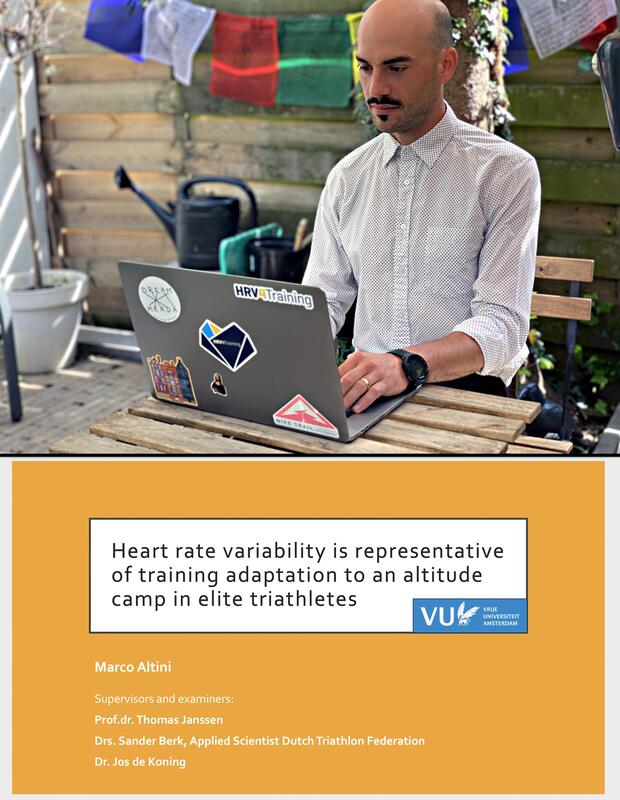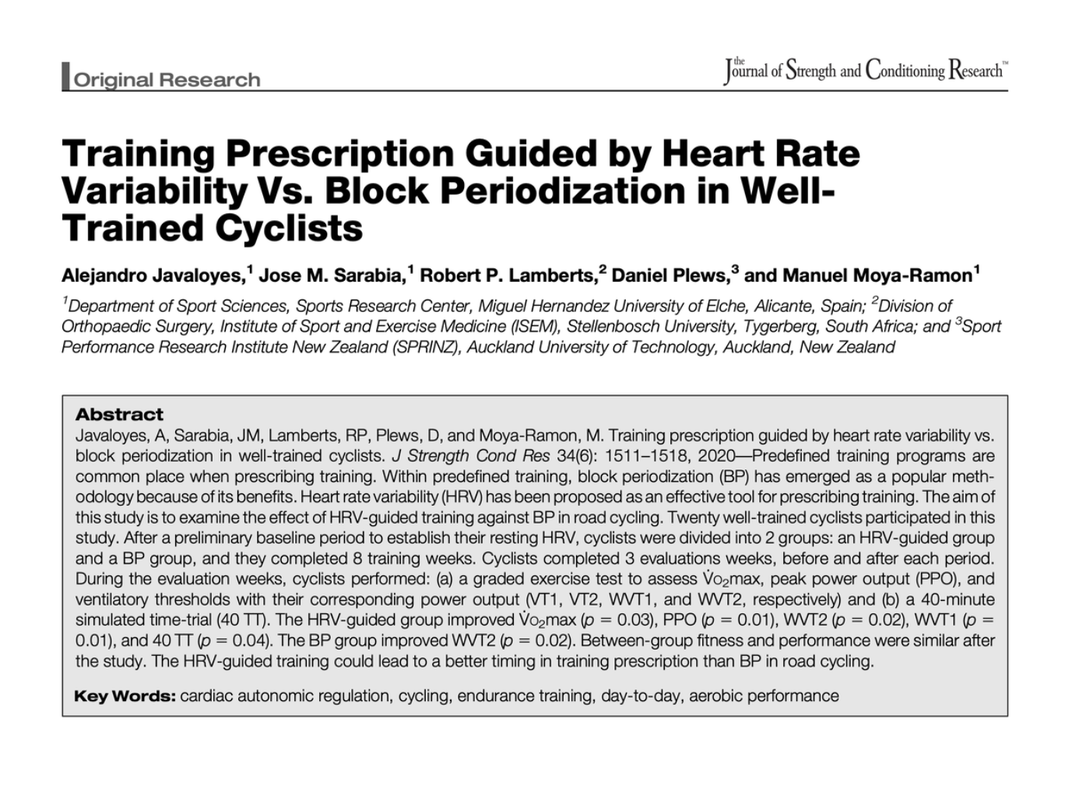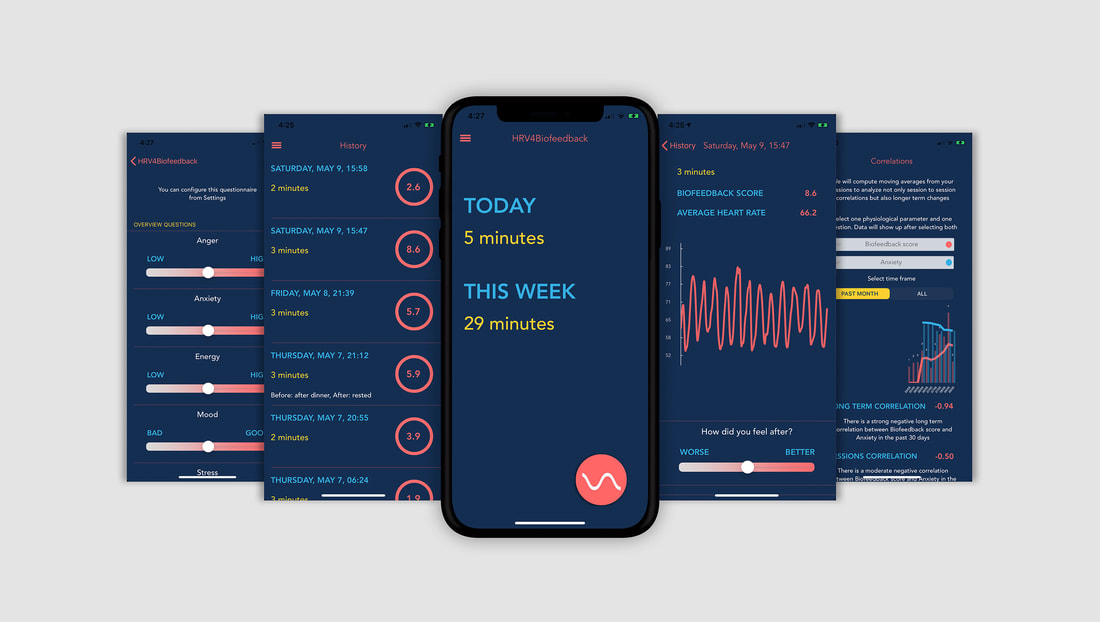|
In questa puntata per gli amici italiani, parliamo di:
- cos'è l'HRV - come ho iniziato a studiarlo - a chi può essere utile questo parametro - come utilizzare i dati - esperienza nel mondo delle startup Grazie Manuel per l'invito I've discussed (virtually) my thesis at Vrije Universiteit Amsterdam and completed my Master's in Human Movement Sciences, specializing in high performance coaching. Abstract of my thesis below or at this link.
We will submit this work for publication, hence at this stage the full text is not available. Objectives: To determine if changes in resting heart rate (HR) and heart rate variability (HRV) during the beginning (first 10 days) of a three-week training camp at altitude are representative of the athlete's training adaptation at the end of the training camp. Methods: Four elite triathletes (2 male and 2 female), spent 23 days in Namibia at 1655 meters of altitude for two consecutive years in January 2019 and January 2020. Resting HR and HRV (the root mean square of successive RR intervals, or rMSSD) were measured daily upon wakening, while training data (GPS, heart rate) was acquired during cycling and running workouts. The athlete group was divided in responders and non-responders to the training camp at altitude based on the ratio between velocity and heart rate during aerobic running workouts of moderate duration. In particular, athletes whose velocity to heart rate ratio during workouts at week three was within the athlete's smallest worthwhile change (SWC) of pre-camp values, were considered responders. The difference in resting heart rate, rMSSD and the coefficient of variation of rMSSD (CV rMSSD) between the two weeks prior to the training camp and the beginning (first 10 days) of the training camp were computed as potential markers of future training adaptation. Results: Resting HR was significantly more elevated during the beginning of the training camp for non-responders (N = 3, HR difference = +4.6 bpm) with respect to responders (N = 4, HR difference = +0.5 bpm, p = 0.023). The CV rMSSD also increased by a greater extent for non-responders (+10%) with respect to re-sponders (-3%, p = 0.015). The difference in rMSSD was lower during the first week of camp for non-responders (-10 ms) with respect to responders (+6 ms), but this difference was not significant (p = 0.336). Conclusions: Athletes that responded positively to a three-week training camp at altitude showed a more favorable physiological response during the beginning of the training camp (smaller resting HR difference, lower CV rMSSD). This information can be used to further adjust training plans at the individual level. In this study, the authors put to the test standard block periodization vs HRV-guided training, showing better results for the HRV-guided approach. Personally, I believe this paper is what I've been working for in the past decade.
It doesn't take much to understand that our capacity to handle stress is limited, and that stressors (training as well as lifestyle) can be better balanced by most of us. It is however far from straightforward to develop valid, reliable and easy to use instruments that can enable this process, to the point that new research and practical insights can be derived consistently by the use of such an instrument. More of this please! > The principle HRV helps us to quantify individual responses to stress. The hypothesis for HRV-guided training is therefore that by providing the most appropriate training stimuli in a timely manner, when your body is ready to take it, positive adaptations will occur and you will be able to improve performance > The protocol The HRV4Training app was used to collect data first thing in the morning. When the HRV baseline fell outside the normal values for an athlete, training intensity changed from high-intensity training to low-intensity training or rest > Outcomes Performance outcomes (VO2max, peak power output, ventilatory thresholds, and a 40-minute time trial) were all improved in the HRV-guided group, which also showed a better physiological profile (reduced CV HRV), highlighting a better response. Learn more about the study, how you can use the same approach and monitor individual responses to stress, at this link Improve self-regulation and better cope with stress using HRV4Biofeedback, the camera-based Heart Rate Variability (HRV) Biofeedback app
WHAT'S BIOFEEDBACK? Heart Rate Variability (HRV) Biofeedback is a technique that can directly affect physiological and psychological factors through deep breathing exercises and is an ideal strategy to help us self-regulate and better cope with stressful situations Practically speaking, HRV Biofeedback consists of providing an individual with real-time feedback on instantaneous heart rate and respiration changes while being instructed to breathe at low frequencies You can learn more about the psychological and physiological benefits of deep breathing and HRV Biofeedback, at HRV4Biofeedback.com HOW CAN I BENEFIT FROM BIOFEEDBACK? Life can be demanding, from both a physical and psychological point of view Our health and performance can be affected by how we are able to effectively cope with stressful situations and deal with anxiety, or in broader terms, our ability to emotionally self-regulate is key The goal of HRV Biofeedback is to improve self-regulation, therefore impacting positively our health and performance |
Marco ALtiniFounder of HRV4Training, Advisor @Oura , Guest Lecturer @VUamsterdam , Editor @ieeepervasive. PhD Data Science, 2x MSc: Sport Science, Computer Science Engineering. Runner Archives
May 2023
|




 RSS Feed
RSS Feed